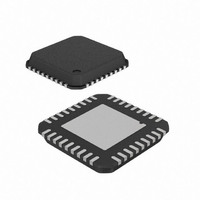AT88RF1354-ZU Atmel, AT88RF1354-ZU Datasheet - Page 29

AT88RF1354-ZU
Manufacturer Part Number
AT88RF1354-ZU
Description
IC RF READER 13.56MHZ 36-VQFN
Manufacturer
Atmel
Datasheet
1.AT88RF1354-ZU.pdf
(48 pages)
Specifications of AT88RF1354-ZU
Frequency
13.56MHz
Features
ISO14443-B
Package / Case
36-VQFN Exposed Pad, 36-HVQFN, 36-SQFN, 36-DHVQFN
Pin Count
36
Screening Level
Industrial
Lead Free Status / RoHS Status
Lead free / RoHS Compliant
Rf Type
-
Lead Free Status / Rohs Status
Compliant
A.10. Communication Range and Interoperability
8547B–RFID–3/09
tags with antennas larger than ID-1 is less than the limits specified in the standard. For tags with antennas smaller than
ID-1 size, a higher magnetic field strength is required. The field strength required is inversely proportional to the area of
the tag antenna.
See amendment 4 to ISO/IEC 10373-6 for the definition of an ID-1 “Class 1” PICC antenna. Any PICC antenna falling
within the “Class 1” dimensions is considered an ID-1 antenna for the purpose of this specification. PCD antennas for
ISO/IEC 14443 have not been standardized by the WG8 working group responsible for ISO/IEC 14443 because PCD
performance requirements are application specific.
Magnetic field strength is measured with a single turn antenna coil. For ID-1 cards the test method and measurement
coil are described in ISO/IEC 10373-6 section 6. For larger or smaller tags the measurement coil must be sized
similarly to the tag for the magnetic field strength to be relevant. Measurements with coils larger or smaller than the
PICC antenna dimensions are misleading since they do not measure the magnetic flux that the PICC antenna will
actually see.
Warning: Exposure to magnetic fields in excess of 30 A/m rms may be hazardous to your health.
The ISO/IEC 14443 standards do not guarantee that any compliant PCD will operate with any compliant PICC. The
standards define the communication interface between a card and reader for contactless smartcard applications. This
interface definition allows the industry to develop compliant card or tag products that can communicate with compliant
readers. The standards reduce development cost and technical risk for manufacturers and users of the protocol. Cards
from multiple manufacturers can communicate with readers from other manufacturers.
The ISO/IEC 14443 standards do not specify or guarantee the distance over which a compliant PICC will communicate
with a compliant PCD. The magnetic field strength requirements described in Appendix A.9 defines the operating
envelope of ID-1 PICCs and allows the PCD manufacturer to measure and specify the volume surrounding the reader
antenna where the ID-1 PICC operating requirements are satisfied. In other words, the developer of a reader for ID-1
cards is expected to specify the operating volume where all requirements of the standard have been met so that the
customer knows if the reader is appropriate for the application.
Since ISO/IEC 14443 explicitly defines the field strength and other requirements for ID-1 cards it is easy for the reader
manufacturer and the system developer to discuss the operating characteristics of a system for ID-1 cards using the
requirements in the standards.
Unfortunately there are no corresponding definitions of the operating conditions for PICCs that are smaller or larger
than the ID-1 format.
Small tags will not operate reliably with large reader antennas. Large tags will not operate reliably with small reader
antennas. If the tag and reader antennas are the same size, then the tag will not operate correctly at close range due to
excessive mutual inductance.
Discussion of the numerous factors impacting the performance of ISO/IEC 14443 systems is beyond the scope of this
document. One rule of thumb estimates that the reliable operating range of a tag is approximately equal to the outside
diameter of the tag antenna when the tag and reader antennas are parallel and the antenna centers are aligned. This
rule assumes that the reader antenna is larger than the tag antenna, but is appropriately sized, and that the reader has
no significant design flaws.
A reliable ISO/IEC 14443 system uses PICCs and PCDs matched to the application, with appropriately sized antennas.
13.56 MHz Type B RF Reader Specification
29












